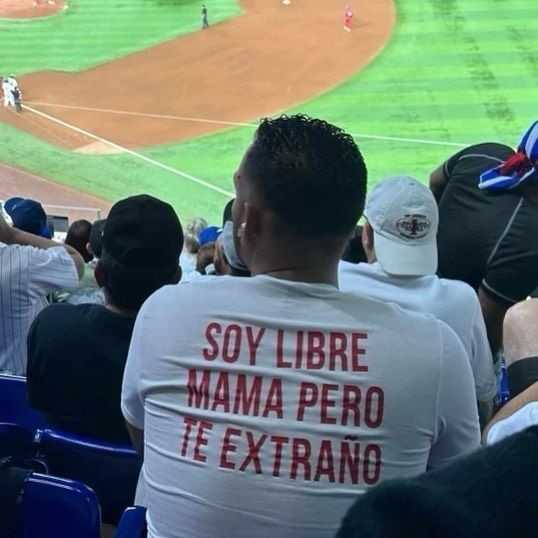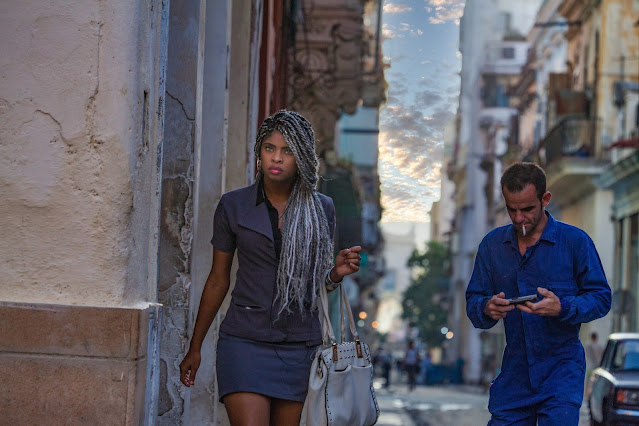Las Damas De Blanco: Isel de las Mercedes Acosta Obregón
This is an English Translation (in progress) of the book, Las Damas de Blanco: las mujeres de los prisioneros de la Primavera Negra de Cuba (2006) | The Ladies in White: the women of the Black Spring prisoners in Cuba by Erika María del Carmen Lüters Gamboa (2006). Click here to read the preceding chapters.
Isel de las Mercedes Acosta Obregón
If there is a person for whom life has never been easy, that (person) must be Isel de las Mercedes Acosta. Not because her husband is currently sentenced to twenty-five years in prison, or because she fears for her health and the difficulties that that entails; but because since she was a child Isel de las Mercedes has lived with the pain of family separation.
After several attempts, we managed to talk to her, thanks to the help of a neighbor who lends her the phone, as often happens with the Ladies in White who live in the province. From the Columbus neighborhood of the city of Sancti Spíritus in the province of Sancti Spíritus, she tells us what her odyssey has been since March 19, 2003, when her husband was taken from his home.
"At three o'clock in the afternoon of that day they stormed my house. My husband was in bed with renal colic. They attacked with everything, forcibly handcuffed him, they wanted to take him out in shorts, barefoot, shirtless. There I interjected myself. I told them that my husband is a very correct man, that he did not go out on the sidewalk in 'shorts'. I asked him to let him dress. They pushed us both, they already had him handcuffed and at my insistence they let him put on his clothes in the living room of the house, they pushed him out, and put him in a patrol car."
For seven long days, she could not see him. He was then given ten minutes (to talk), but only to talk about family issues, nothing about the court case could be discussed. As with the other detainees, after a day of trials he learned of his sentence: 30 years in prison.
"I appealed to the Supreme Court; the lawyer who represented him asked for the annulment of the sentence, which was full of errors. Due to the appeal, the sentence was reduced to 25 years." Blas Giraldo Reyes spent the next 17 months in a completely boarded-up cell. "That's where he really lived-out the ordeal, in an isolation cell in prison. In bed, a small plateau recessed in the wall prevented him from lying down causing him to fall. So instead, he spent all his time sleeping on the floor, drinking contaminated water from the turco that was very close to his bed," he recalls.
Visits were allowed every three months for only two people. Marriage encounters, every five. "Sometimes I spent up to six months without seeing him because we had to take turns with his parents who are elderly people, our son, and when my son entered…. I could not enter," she recalls.
“Nor were there many things that I could bring to him in jail. Only thirty pounds every three months were allowed to be delivered. "That included literature, grooming, and food. When literature and grooming weighed too much, I could hardly leave him any food."
"He didn't know when it was day or night, all he had was a small hole in the wall through which he could try to see light and get air," she says regretfully.
After Matanzas, he was finally transferred to Sancti Spiritus, where they live. "Two weeks ago, they took him out and to detachment 12 which is more open. He tells me that he sees the sun, that he sees the sky, the horizon. There he is with eighty other common prisoners."
In June 2005 his only son, twenty-one years old, emigrated into exile in Miami, along with the parents of Isel de las Mercedes. And although she had been allowed to travel with him, she affirms that "I stay here because it is my duty. Until my husband is released from prison, I will be here giving him all my support and what he needs."
Without her paternal family, without her son, and with her husband imprisoned, Isel sums up what her life is like: "I have such a big emptiness. But I am a person of great faith and all this suffering I give to the Lord and let him work with us, let him do his will.
The day before yesterday my son called me and God gave me the strength to talk to him and not cry, for that I drops the phone, for why should I tell him? He is the only little child we have, I am practically alone, my husband is in prison, I am here in the house - imagine and consider how I feel? "she states breathlessly.”
Having obtained visas for the United States is the product of a family history full of vicissitudes, which began when she and her husband were children of political prisoners. "I have a sister who stayed with me but already has to travel because her visa expires and I do not agree with her losing the visa; she has her son there. That's why I try to give him the strength to make his trip and get together with his other family," she explains, trying to be strong.
The sufferings for Isel de las Mercedes began when she was ten years old and the Escambray was cleaned (see note).
"We are one of the families exiled to Pinar del Río. It was 1971 when my dad was summoned to a meeting. He said to my mother, 'How strange it was since I don't participate in anything!’ That's when they arrested him, took him to Santa Clara, and from there they put him on a train and took him to Pinar del Río. “At home, we spent fifteen days crying because we did not know where my father was, that is until we received notice that he had been transferred to Pinar del Río," he says, reliving what those days were like.
Thus began the trips to that province together with his mother. "Pinar del Río was unknown to us. We lived in the interior, but asking and stumbling, as we Cubans say, we arrived at where my father was being held in the Alambradas de Santa Ana, in the municipality of San Cristóbal."
"They put him to work in agriculture, cutting sugar cane, and spending a lot of time working and living in subhuman conditions, in warehouses full of humble peasants. They were then distributed to other concentration camps. He was taken to a place they call San Carlos, (there) they began to build a village, the prisoners themselves constructed the buildings" he says.
Meanwhile, Isel de las Mercedes and his mother continued "working and suffering. Looking for food for ourselves and for my father, making the money they needed to support ourselves and take food to Pinar del Río," the story continues.
"In 1975 they gave my father a house. I was fourteen years old and I remember that they took us in some 'guaguas' (buses) to Santa Clara and then, in a train filled with policemen to where we arrived at an unknown town, with only buildings. There were no sidewalks. The streets were swamps. We didn't know anything about where we were going. It was on that trip that I met my husband. I became his girlfriend at fifteen and married him at eighteen. There in the adjoining village, we made our home, our family; our son was born there in the captive village."
Only in 1990 were those, who wanted to be, allowed to return to their home provinces. "His father, my father - we decided to return to Sancti Spiritus."
In this province, she is the only Lady in White but that does not intimidate her to go every Sunday to the church, "all dressed in white," she has that diminutive speech that makes her familiar. Isel has never worked, always her job has been the tasks of the house and helping her husband with the independent library that they kept in their home until the moment of arrest and where she was in charge of Christian and children's literature.
"The library, named 20 de Mayo, was completely destroyed, they took everything to us, even the rustic shelves we made with old wood. "
Blas, a surveyor by profession, when he could not get a job for political reasons, earned a few pesos working as a potter in a tile factory. "He also found work in the fields, planting with the peasants who gave him the opportunity, earned 10 or 15 pesos, and with his sweat brought an honest sustenance of the family to the house," he says.
The day we talked, Isel de las Mercedes was arriving from the prison hospital where her husband, at fifty years old, is admitted as a result of generalized osteoarthritis. "I have such great joy because they are already going on three years in prison and it is the first time in all that time that I have shared so much time with him, talking. We have had such a dire need to talk, and we have been able to do it."
The conversation has now lasted more than half an hour and we thank you for having opened your heart to tell, with so much feeling, almost the whole story of your life.
Before saying goodbye, she reflects: "I have shed many tears since I was a child.... (It breaks my heart) But those tears and that ordeal, I carry with great pride, with great pride. Because for political reasons I carried the jabas (bags of food) to a prison when I was a child and today being a forty-four-year-old lady I still carry jabas for prison, but with my head very high and my morale very high. "
Note 1: Between 1960 and 1965 an anti-Castro guerrilla movement emerged in the Escambray mountains. Between 1970 and 1985 the regime banished those who supported that movement, especially peasants, for being disaffected with the revolution. Then they were taken to live in the "captive villages", which were built by themselves.
Note 2: Carrying jabas, is a term widely used by the Ladies in White when referring to the bags of food that takes their relatives to prison.









Comments
Post a Comment
Please feel free to share your #soscuba story here. If you would like to be featured on this page, please Submit Your Story online at cubanswithwings.com